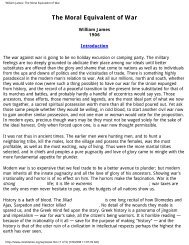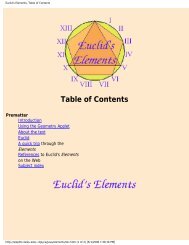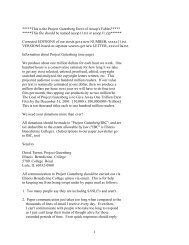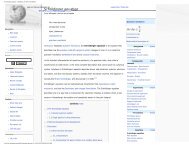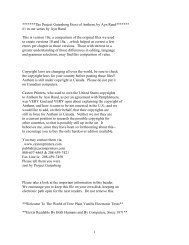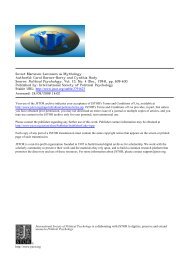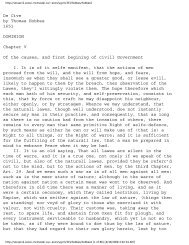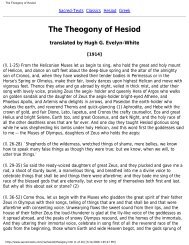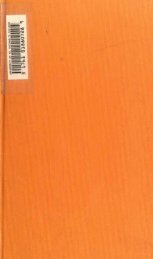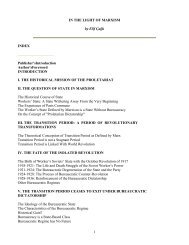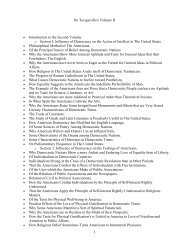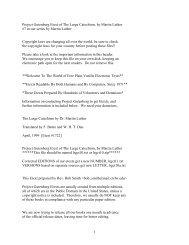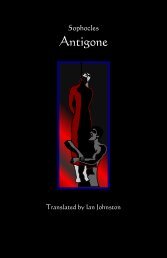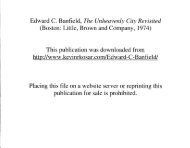Thomas Jefferson: A Manual of Parliamentary Practice
Thomas Jefferson: A Manual of Parliamentary Practice
Thomas Jefferson: A Manual of Parliamentary Practice
You also want an ePaper? Increase the reach of your titles
YUMPU automatically turns print PDFs into web optimized ePapers that Google loves.
<strong>Thomas</strong> <strong>Jefferson</strong>: A <strong>Manual</strong> <strong>of</strong> <strong>Parliamentary</strong> <strong>Practice</strong><br />
one, privileged or not; to wit, a question <strong>of</strong> order arising out <strong>of</strong> any other question, must be<br />
decided before that question. 2 Hats. 88.<br />
A matter <strong>of</strong> privilege arising out <strong>of</strong> any question, or from a quarrel between two members, or<br />
any other cause, supersedes the consideration <strong>of</strong> the original question, and must be first<br />
disposed <strong>of</strong>. 2 Hats. 88.<br />
Reading papers relative to the question before the House. This question must be put before<br />
the principal one. 2 Hats. 88.<br />
Leave asked to withdraw a motion. The rule <strong>of</strong> Parliament being, that a motion made and<br />
seconded is in possession <strong>of</strong> the House, and cannot be withdrawn without leave, the very<br />
terms <strong>of</strong> the rule imply that leave may be given, and consequently may be asked and put to<br />
the question.<br />
SEC. XXXIV.<br />
THE PREVIOUS QUESTION.<br />
WHEN any question is before the House, any member may move a previous question<br />
"Whether that question (called the main question) shall now be put" If it pass in the<br />
affirmative, then the main question is to be put immediately, and no man may speak any thing<br />
further to it, either to add or alter. Memor. in Hakew. 28. 4 Grey 27.<br />
The previous question being moved and seconded, the question from the chair shall<br />
be, "Shall the main question be now put"11 and if the nays prevail, the main<br />
question shall not then be put. Rule 9.<br />
This kind <strong>of</strong> question is understood by Mr. Hatsell to have been introduced in 1604. 2 Hats.<br />
80. Sir Henry Vane introduced it. 2 Grey 113, 114. 3 Grey 384. When the question was put in<br />
this form, "Shall the main question be put" a determination in the negative suppressed the<br />
main question during the session; but since the words "now put" are used, they exclude it for<br />
the present only. Formerly indeed, only till the present debate was over; 4 Grey 43. but now,<br />
for that day and no longer. 2 Grey 113, 114.<br />
Before the question "whether the main question shall now be put" any person might,<br />
formerly, have spoken to the main question, because otherwise he would be precluded from<br />
speaking to it at all. Mem. in Hakew. 28.<br />
The proper occasion for the previous question is, when a subject is brought forward <strong>of</strong> a<br />
delicate nature, as to high personages, &c. or the discussion <strong>of</strong> which may call forth<br />
observations which might be <strong>of</strong> injurious consequences. Then the previous question is<br />
proposed: and, in the modern usage, the discussion <strong>of</strong> the main question is suspended, and<br />
http://www.constitution.org/tj/tj-mpp.htm (40 <strong>of</strong> 70) [4/14/2008 6:37:46 PM]



